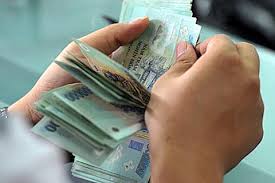The latest proposal to tax an individual’s income from the interest accrued from the savings deposited in banks has become a bone of contention between the parties concerned.

The latest proposal to tax an individual’s income from the interest accrued from the savings deposited in banks has become a bone of contention between the parties concerned.
At a meeting held last week to discuss tax laws, lawyer Truong Thanh Duc from Basico Law Firm noted that all the savings in banks earn an income of more than VND200 million (US$8,800 ) per year through the interest rate should be taxed.
At an interest rate of roughly 6 per cent to 7 per cent per year, individuals will have to deposit roughly VND3 billion in banks to get an interest of VND200 million per year.
According to the current legal regulation, only income from the interest rate on savings deposited in banks by companies is subject to income tax.
Duc said that the tax proposal was in accordance with the international rules. An income of up to VND200 million, which is earned through the interest rate accrued on savings in banks, should be considered an investment, and so, taxing it is appropriate, he added.
Besides, he said, under the country’s current legal regulation, an income exceeding VND108 million per year is subject to the personal income tax (PIT). Therefore, an interest rate on an individual’s savings of more than VND200 million should be subject to taxation.
Similar to the 5 per cent PIT regulation for dividends applied currently, a similar tax should be considered on a deposit of more than VND3 billion, Duc said. If the tax management agency does not have a comprehensive database, it is possible to apply the tax collection method for current income.
In addition to this, the income from the purchase of bonds and central bank bills should also be subject to PIT, he said.
Backing this proposal, financial expert Nguyen Tri Hieu said that in principle, all income must be taxed. He said that in many countries, at the end of the year, the banking system provides a list of customers to the tax authority, who then calculates the PIT based on the income.
However, Hieu admitted that if the tax was applied, then it would make it difficult for banks to mobilise deposits. Therefore, a limit should be considered to exempt or raise family allowances for PIT deduction, in a move to reduce the impact on people, he suggested.
Other experts, meanwhile, opposed the proposal, saying that it would hurt investment capital.
Nguyen Anh Phong from the HCM City University of Economics and Law said that banks were still the main channel to mobilise and supply capital for the country’s investment and development. The annual credit growth was in proportion to the GDP growth.
If interest on deposits is charged, many depositors would withdraw their money from the banks. The banks would then have to increase the deposit rates to retain depositors, triggering a corresponding increase in the lending rates, Phong said. It will increase the pressure on capital costs for enterprises, and reduce the competitiveness of goods and services.
This is not the first time that a tax on interest from savings deposited in banks has been proposed. In 2013, HCM City Real Estate Association also issued a proposal to impose an income tax on deposits of over VND500 million to encourage the cash flow into production and business, but the proposal faced strong opposition from the local people and economists. – VNS





